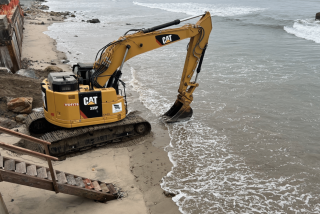Geffen to Reimburse $300,000
- Share via
Record producer David Geffen has agreed to reimburse the state and a nonprofit group $300,000 in attorneys fees and costs incurred during his nearly three-year legal effort to block public beach access next to his Malibu home, state officials announced Friday.
The announcement came after the 12-member California Coastal Commission voted Friday to approve the settlement of Geffen’s lawsuit, and the commission’s countersuit, over the pathway to Malibu’s Carbon Beach.
The 9-foot-wide easement, now enclosed by two sets of locked wooden gates, will open soon to allow the public to walk from Pacific Coast Highway to the beach. It will provide an access way through a phalanx of oceanfront homes that stretches nearly four miles in eastern Malibu.
The easement across Geffen’s property is the first of 10 new pathways to the beach that the Coastal Commission is pushing to open in some of the most exclusive enclaves in Malibu. There are more than 100 other blocked routes to the shoreline through seaside residential communities in Laguna Beach, Santa Barbara, Gualala in Mendocino County and San Mateo County.
Peter Douglas, executive director of the Coastal Commission, called Geffen’s case a key victory in a decades-long battle to open the coast. Geffen made a legal promise to open the pathway in 1983, when he received permits from the commission to begin building his Cape Cod-style compound over multiple beachfront lots.
“With all of the lobbying power and legal power he could afford to buy, in the end, the public’s rights prevailed,” Douglas said. “This should send a signal to other holdouts. We are going after them with equal vigor that we did in Geffen’s case.”
Geffen and his spokesman, Andy Spahn, declined to discuss the case. “We’re not commenting,” Spahn said.
On Wednesday, another Geffen assistant turned over the key to the double set of locked gates to Steve Hoye, co-founder of the nonprofit Access for All. His group has an agreement with the Coastal Commission and the state Coastal Conservancy to manage the public walkway on behalf of the state.
Hoye said he hopes to open the gates in about a week, as soon as he can line up volunteer monitors and trash cans and figure out how to make the walkway safe for the public. Right now, he said, winter waves and tides have scoured sand from the beach, leaving a drop-off of a few feet at the end of the paved walkway.
“I have a real obligation to make sure no one falls,” Hoye said.
Access for All recently received a $35,000 grant from the Coastal Conservancy, which, among other things, will help design and construct a new locking gate that will automatically open at sunrise and close at sunset. Those will be the hours of operation, he said.
Initially, Hoye said, he plans to open the new access way quietly. Later in the year, he and Coastal Commission staff are planning to hold an official celebration.
“I’m looking at Memorial Day,” Hoye said of the holiday that is often considered the opening day of the summer beach season.
Hoye estimated that his legal fees would be only about $25,000. Most of the $300,000 from Geffen is going to reimburse the California attorney general’s office, which defended the Coastal Commission and the Coastal Conservancy against Geffen’s lawsuit.
Daniel A. Olivas, the deputy attorney general who handled the case, said the settlement would not be complete until lawyers write up the terms and circulate them to the Coastal Commission, the Coastal Conserv- ancy and Geffen for final approval.
Geffen has agreed to dismiss his suit and the Coastal Commission will dismiss its countersuit, which could have sought fines of $1,000 or more a day if it proved that Geffen had knowingly and intentionally violated the Coastal Act.
Olivas characterized the settlement as a “good deal” for state residents. “The taxpayers have had to foot the bill for the state’s litigation fees and costs,” he said. “Mr. Geffen will be reimbursing them for those costs.”
The settlement was one of the larger fees collected to settle a beach access dispute. The Coastal Commission has been engaged in 21 legal fights over long-promised access ways across private property for the public to reach the shore or stroll along the beach.
The costliest settlement came two years ago. Wendy McCaw, the owner of the Santa Barbara News-Press, paid $460,000 in fines to settle her lawsuit that sought to keep the public away from a 500-foot strip of land below her 25-acre bluff-top estate in Santa Barbara’s Hope Ranch.
More to Read
Sign up for Essential California
The most important California stories and recommendations in your inbox every morning.
You may occasionally receive promotional content from the Los Angeles Times.










